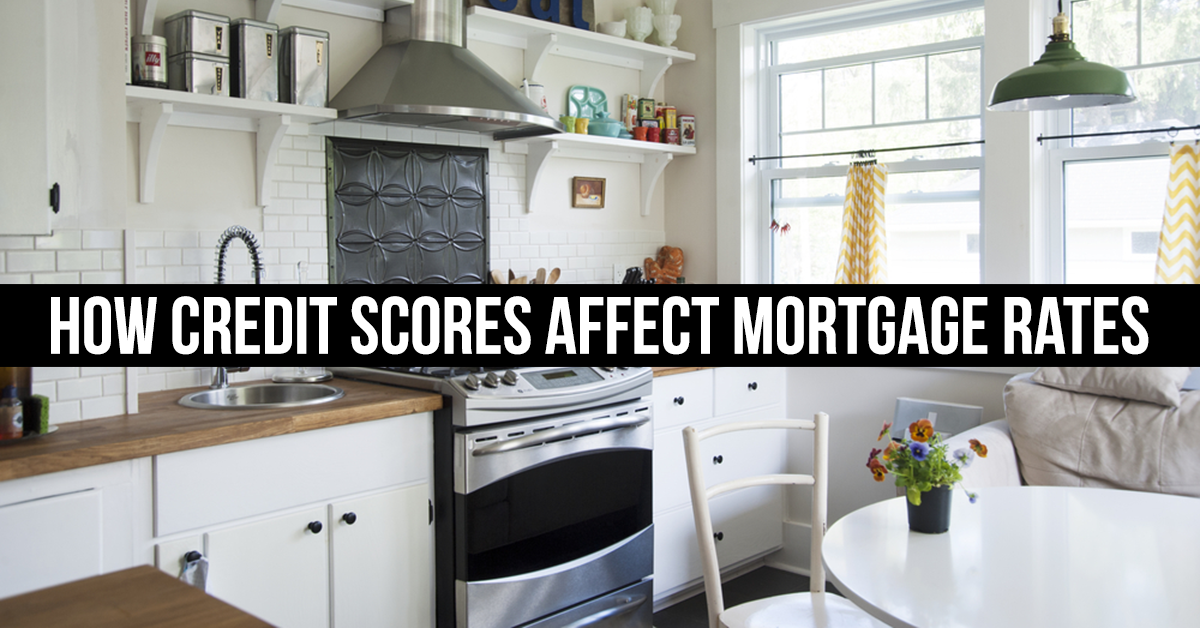How Your Credit Score Affects Your Mortgage Rate
Without a high credit score, you won’t qualify for the best mortgage rates available, which could mean you’ll end up paying more money over the term of your mortgage. Even with rates at historic lows right now, the difference between 3.5% and 3.75% can add up, especially if you’re applying for a 30-year fixed-rate mortgage.
Why does your credit score matter to lenders?
Along with a low debt-to-income ratio and a strong financial history, a high credit score gets you a low mortgage rate. But why?
You’d probably be hesitant to lend money to a friend who usually takes forever to pay you back — or doesn’t pay you back at all. Lenders feel the same way when it comes to mortgages. They want to lend to people who have a record of on-time payments to creditors.
“If somebody has a high credit score, what that shows us is that they’ve been good on meeting their obligations, whether it be credit cards, car loans or other home loans in the past,” says Brian Hoovler, a loan production partner with People’s Home Equity in San Francisco. “It means we’re more likely to want to give you a loan, because we know you’re going to pay us back.”
Your credit score is calculated most often with the FICO scoring model, and is derived from the information on your credit reports, which are compiled by credit reporting companies. Your reports include a history of your payment habits with borrowed money.
Your credit score is “one of the most important parts to qualify,” says Michelle Chmelar, vice president of mortgage lending with Guaranteed Rate in New York. “But it is a part. You have to have the whole package: income, sufficient assets and credit.”
Best scores for conventional loans
“Typically, when you have a score of 700-plus, you’ll get a pretty good interest rate,” says David Lin, a former director of risk management for consumer credit at Barclays and Citibank. He says that while you can still qualify for certain loans if your score is under 680, the 700s are where you want to aim in order to pay the lowest rates.
If you’re at the top of the scale, say 720 or above, you’re in the territory known as excellent. As you move down toward 700, your score is considered good. Once you get to 680, you’re heading toward average, and if you’re closer to 640, you might have trouble getting a conventional mortgage from a bank or online lender, Chmelar says.
The lending industry carves up the credit score scale into 20-point increments and adjusts the rates it offers borrowers each time a credit score moves up or down by about 20 points. For instance, if your score drops to 740 from 760, you’re likely to see a small bump up in the rate you’ll be offered. In the industry, this is called “loan-level pricing,” and every time you go down a level, there’s an increase in costs, according to Hoovler.
“If you have a score of 760 or above,” Hoovler says, “you’re pretty much golden. From there down, every 20 points you’ll start seeing small hits here and there.”
Chmelar offers up a scenario to illustrate a 100-point difference in credit scores:
A borrower with a 20% down payment is applying for a 30-year, fixed-rate, $300,000 loan to purchase a single-family home in Westchester County, New York. She has a 780 FICO credit score, which gets her a 3.5% rate. Out of pocket, that’s $1,347 a month.
If the borrower’s score dropped by 100 points to 680, her rate would bump up to 3.75%, and her monthly payments would increase to $1,389, an extra $42 a month, or $500 per year. “That’s a lot of fun at Starbucks,” Chmelar says.
The impact of the difference in the rates may not seem significant at first, but added up over years, you could end up paying a lot. For example, Chmelar’s 100-point-drop scenario has the borrower paying an additional $15,120 over a 30-year period.
If your score is already good, however, you should consider taking the rate you qualify for. “The difference between a 710 and a 750 score is not so huge that you should wait to raise it,” Hoovler says. If mortgage rates go up while you’re fine-tuning your credit score, “the increase is in all likelihood going to offset any benefit the higher credit score gives you.”
Other loan types
With conventional loans — those backed by Fannie Mae and Freddie Mac — a lot of focus is put on your credit score, according to Dan Keller, a mortgage advisor at New American Funding in Seattle.
Government-insured FHA and VA mortgages, on the other hand, may accept a score as low as 580. The impact of that lower score won’t be as substantial as it would be with a conventional loan, Keller notes. He says to get the best interest rate with an FHA or VA loan, the focus isn’t on a 760 score as it is with conventional loans — it’s on 700+.
So, there’s some leniency when it comes to credit scores and underwriting guidelines with government loans. But the loan fees are more expensive: You’ll have to pay private mortgage insurance, as well as an upfront and an annual mortgage insurance premium.
Jumbo loans — loans that exceed conforming limits imposed by Fannie and Freddie — have stricter credit score requirements. “Ideally you’d want to be at 760 or above for a jumbo loan,” Hoovler says.
But those credit score guidelines don’t tell the whole story. Most lenders have what are known in the industry as “overlays,” which are extra requirements or standards that allow them to require higher credit scores as a precaution, regardless of loan type.
Hoovler says these overlays vary widely from company to company, and if a borrower fails to meet overlay requirements with one lender, it doesn’t mean a mortgage is out of reach. “Just because one lender says you’re not qualified doesn’t mean you can’t get a loan,” he advises. “It just means you may have to do some more digging to find somebody who’s willing to work either with your credit situation as is, or is willing to help you find someone who can put you into a better credit situation.”
How to improve your credit score
Here are some of the best ways to improve your credit score:
- Make payments, including rent, credit cards and car loans, on time.
- Keep your spending to no more than 30% of your limit on credit cards.
- Pay down high-balance credit cards to lower balances, and consider balance transfers to free up credit.
- Check for any errors on your credit report, and work toward fixing them.
- Shop for mortgage rates within a 30-day period — too many spread-out inquiries can lower your score.
- Work with a credit counselor or a lender to improve your score.
“The number one way to improve your credit score is to look at your balance-to-limit ratio,” Keller says. “For example, if you had a credit card with a $10,000 limit, and I pull your credit and you’ve got $8,000 charged on that and your credit score is a 726, if I can get you to pay down that credit card to 30% or less — down to $3,000 — your credit score would jump substantially.”
The article How Your Credit Score Affects Your Mortgage Rate originally appeared on NerdWallet.


